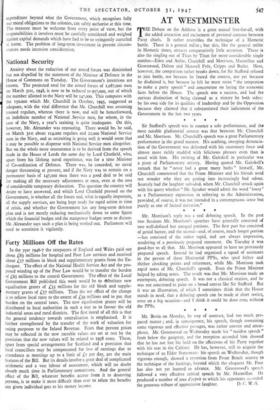National Security
Anxiety about the reduction of our armed forces was diminished but not dispelled by the statement of the Minister of Defence in the House of Commons on Tuesday. The Government's intentions are known. The projected total for the armed forces of 1,087,000 men on March 31st, 1948, is now to be reduced to 937,000, Out of which the number allotted to the Navy will be 147,000. This compares with the 150,000 which Mr. Churchill in October, 1945, suggested as adequate, with the vital difference that Mr. Churchill was assuming trained regulars, whereas there is now, and will be henceforward, an indefinite number of National _Service men, for whom, in the case of the Navy, a year's training is quite inadequate. On this, however, Mr. Alexander was reassuring. There would be, he said, on March 31st about 114,000 regulars and 22,000 National Service men in the Navy, and as recruiting is going well it would seem that it may be possible to dispense with National Service men altogether. But on the whole more reassurance is to be derived from the speech made in the House of Lords the same day by Lord Chatfield, who, apart from his lifelong naval experience, was for a time Minister of Co-ordination of Defence. There was, he conceded, no naval danger threatening at present, and if the Navy was to remain on a permanent basis of 147,000 men there was a good deal to be said for making all the necessary adjustments at once, even at the cost of considerable temporary dislocation. The question the country will desire to have answered, and which Lord Chatfield pressed on the Government, is whether all the forces and, what is equally important, all the supply services, are being kept ready for rapid action in time of crisis, and whether the Government has any long-term defence plan and is not merely, reducing mechanically down to some figure which the financial budget and the manpower budget seem to dictate. Mr. Alexander says such a plan is being worked out. Parliament will need to scrutinise it vigilantly.


































 Previous page
Previous page